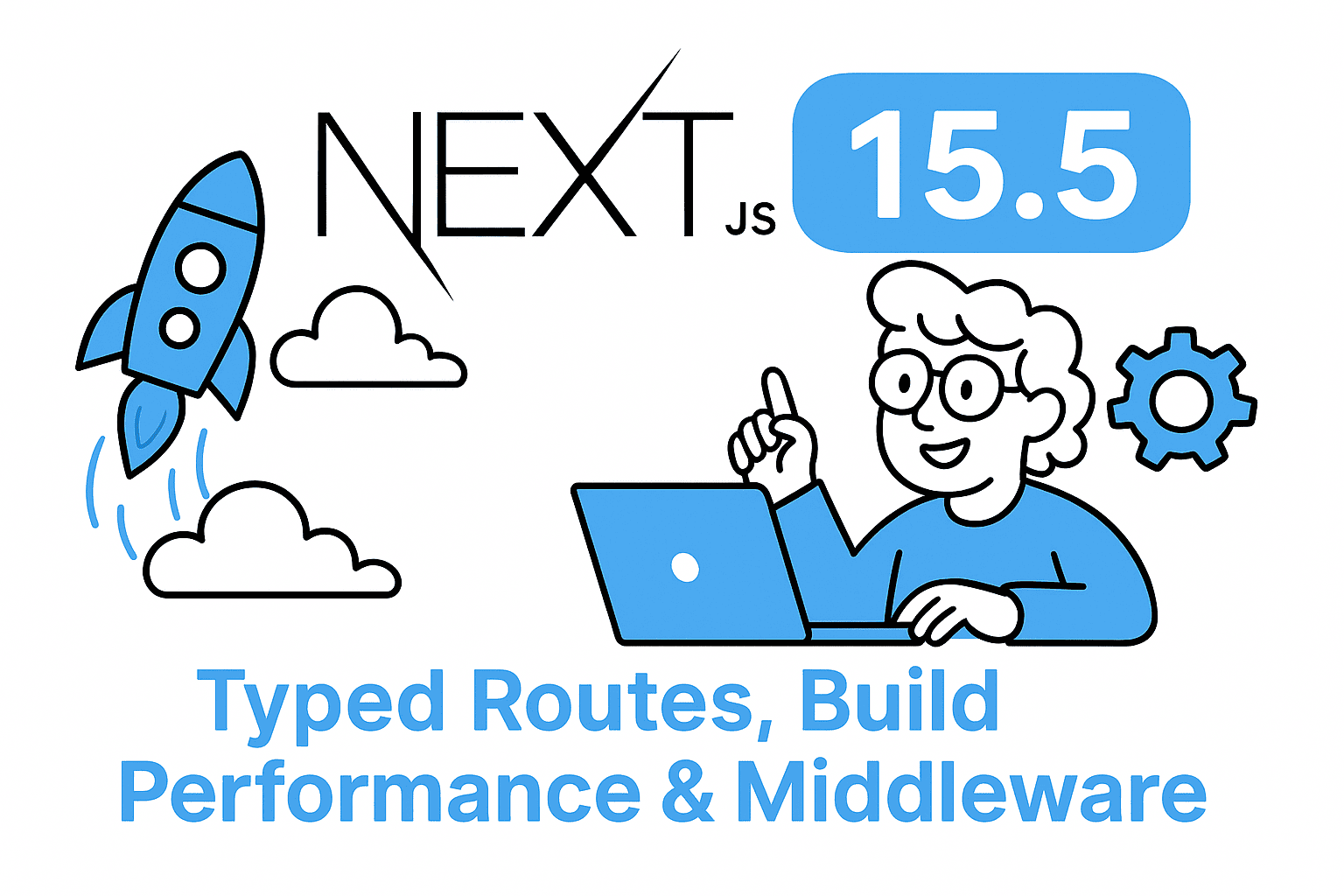Published August 18, 2025, Next.js 15.5 delivers powerful enhancements that accelerate builds, modernize middleware, elevate TypeScript, refine linting, and pave the path to Next.js 16.
Why It Matters
Next.js 15.5 isn’t just another version—it’s a strategic milestone. It empowers developers to build faster, more reliably, and with stronger type safety, all while preparing for the upcoming 16 release.
Turbopack Builds in Beta: Build Speed, Reinvented
- Feature: The next build
--turbopackcommand now supports production builds in beta. - Benefit: Vercel sites like nextjs.org are already powered by Turbopack, handling over 1.2 billion requests, and delivering 2–5× faster builds.  
Sample Script (package.json):
{
"scripts": {
"build": "next build --turbopack",
"start": "next start"
}
}
Node.js Middleware: Stable, Powerful, Full-Stack Capable
- Feature: Middleware now runs on the Node.js runtime—no more edge-only limitations.
- Benefit: You can now use fs, crypto, and other npm packages directly within middleware logic.  
Example: middleware.ts
import { NextRequest, NextResponse } from "next/server";
export const config = { runtime: "nodejs" };
export function middleware(req: NextRequest) {
const fs = require("fs");
const crypto = require("crypto");
// Simulated token validation
const token = req.headers.get("authorization");
if (!isValid(token)) {
return NextResponse.redirect(new URL("/login", req.url));
}
return NextResponse.next();
}
function isValid(token: string | null) {
// Validate using crypto
return Boolean(token);
}
TypeScript Improvements: Typed Routes, Code Integrity, Productivity
Features
- Typed Routes: Compile-time path validation in
<Link />and router.push(). - Route Export Validation: Ensures consistency across layout and handler exports.
- Global Types: Auto-available PageProps, LayoutProps, and RouteContext.
- next typegen: New CLI for manual type generation in CI workflows.  
Enable typed routes:
// next.config.js
module.exports = {
typedRoutes: true,
};
Run type generation:
npx next typegen
Code Example: Typed Routes in Action
Enable typed routes in your next.config.js:
// next.config.js
/** @type {import('next').NextConfig} */
const nextConfig = {
experimental: {
typedRoutes: true, // ✅ Enable typed route validation
},
};
module.exports = nextConfig;
Example project structure:
app/
├─ dashboard/
│ ├─ page.tsx
│ ├─ [id]/
│ │ └─ page.tsx
├─ settings/
│ └─ page.tsx
Using <Link /> with typed routes:
// app/page.tsx
import Link from "next/link";
export default function HomePage() {
return (
<main>
<h1>Welcome</h1>
{/* ✅ Valid route, compiles fine */}
<Link href="/dashboard">Go to Dashboard</Link>
{/* ❌ Invalid route: typo will throw a compile-time error */}
<Link href="/dashbord">Broken Link</Link>
{/* ✅ Dynamic route with typed param */}
<Link href="/dashboard/123">Dashboard Item</Link>
</main>
);
}
Using router.push() with typed routes:
"use client";
import { useRouter } from "next/navigation";
export default function DashboardButton() {
const router = useRouter();
function goToSettings() {
// ✅ Correct usage
router.push("/settings");
// ❌ Wrong usage: This will cause a compile error
router.push("/settingz");
}
return <button onClick={goToSettings}>Go to Settings</button>;
}
Typed routes in API calls:
"use client";
import { useRouter } from "next/navigation";
export default function DashboardRedirect({ id }: { id: string }) {
const router = useRouter();
function viewDashboard() {
// ✅ Safe dynamic navigation
router.push(`/dashboard/${id}`);
}
return <button onClick={viewDashboard}>View Dashboard {id}</button>;
}
✅ Why This Matters
- No more silent 404s → Typos in routes are caught at build time.
- Dynamic safety → Even parameterized routes (/dashboard/[id]) are type-checked.
- Consistency → Works across
<Link />, router.push(), and even API routes.
Next lint is Deprecated: Own Your Linting with ESLint or Biome
- Change: The next lint command is now deprecated.
- Action: Switch to explicit linter setups like ESLint or Biome using your preferred tooling.  
Example package.json:
{
"scripts": {
"lint": "eslint . --ext .js,.ts,.jsx,.tsx"
},
"devDependencies": {
"eslint": "^8.0.0",
"eslint-config-next": "latest"
}
}
Deprecation Warnings for Next.js 16: Get Ahead of the Curve
To ease your upcoming upgrade to Next.js 16, 15.5 already flags deprecated features:
| Deprecated Feature | Replacement/Action |
|---|---|
legacyBehavior (in <Link>) |
Use the modern <Link> syntax |
| AMP (useAmp, amp: true) | Migrate to SSR/DSG approaches |
<Image quality> prop |
Replace with default or configured fallback |
| Local image paths with query strings | Conform to images.localPatterns config |
Developer Workflow & Real-World Impact
Here’s what to do today to get the most out of Next.js 15.5:
- Build faster: Run next build
--turbopackand measure improvements. - Enhance middleware: Leverage Node’s full API surface in middleware configurations.
- Boost type safety: Activate typedRoutes and generate type definitions in your CI.
- Modernize linting: Ensure robust linting pipelines using standalone tools.
- Upgrade-ready: Refactor deprecated patterns before Next.js 16 hits.
TL;DR
Next.js 15.5 is a strategic, developer-first release: it dramatically improves build times, stabilizes full-server middleware, strengthens type safety, unifies linter strategy, and cues developers for Next.js 16. Upgrade now to build faster, code smarter, and stay future-ready.
🤝 Need a Custom RSVP System or Dashboard?
I help businesses build tools that actually work — even on tight deadlines.
Whether you're planning an event, need internal tools, or want a custom dashboard for your team — I can help.
Reach out
📧 Email: safi.abdulkader@gmail.com | 💻 LinkedIn: @abdulkader-safi | 📱 Instagram: @abdulkader.safi | 🏢 DSRPT
Drop me a line, I’m always happy to collaborate! 🚀

